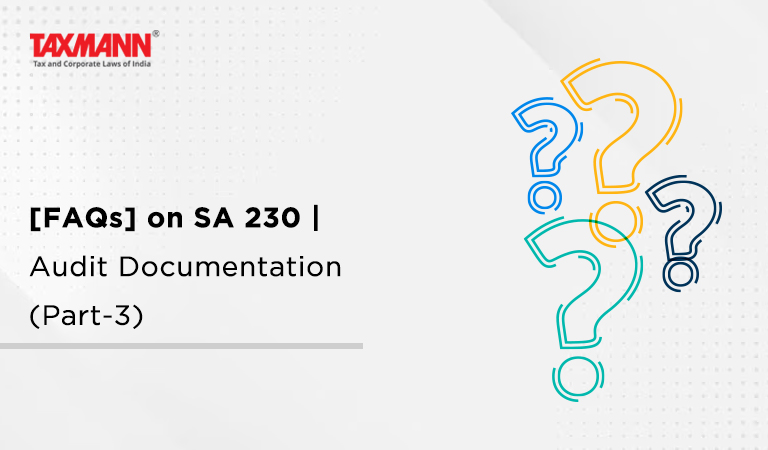FAQs on SA 230 | Audit Documentation (Part-3)
- Blog|News|Account & Audit|
- 2 Min Read
- By Taxmann
- |
- Last Updated on 22 March, 2023

Audit documentation is considered the backbone of an audit. The work that the auditor performs, the explanations given to the auditor and the conclusions arrived at, all are evidenced by documentation. SA 230 deals with the responsibility of the auditor to prepare audit documentation for an audit of financial statements. The objective behind the preparation of the audit documentation that provides
(a) a sufficient and appropriate record of the basis for the auditor’s report
(b) evidence that the audit was planned and performed in accordance with the SAs and applicable legal and regulatory requirements.
To make it easier to understand the stipulations under SA 230, the standard has been broken down into a Q&A format.
FAQ 1. When should an auditor prepare audit documentation?
Timely preparation of sufficient and appropriate audit documentation is important for improving audit quality and facilitating effective review and evaluation of audit evidence. Preparing sufficient and appropriate audit documentation on a timely basis helps to enhance the quality of the audit. Documentation prepared after the audit work may be less accurate than documentation prepared at the time such work is performed and susceptible to risks if the work was performed after the auditor’s report was issued.
FAQ 2. What should be the audit documentation in the case of a smaller/less complex entity?
The extent of audit documentation for smaller/less complex entities may be comparatively lower than for larger entities, and in some cases, the documentation may be limited to a representation letter due to fewer audit procedures and personal communication. Here there may be more personal communication and formally there may only be the representation letter as audit documentation.
When preparing audit documentation, the auditor of a smaller entity may also find it helpful and efficient to record various aspects of the audit together in a single document. Application and Other Explanatory Material given in the standards on auditing also mention the lesser documentation and deals with considerations specific to smaller entities.
Click Here To Read The Full Story
Disclaimer: The content/information published on the website is only for general information of the user and shall not be construed as legal advice. While the Taxmann has exercised reasonable efforts to ensure the veracity of information/content published, Taxmann shall be under no liability in any manner whatsoever for incorrect information, if any.

Taxmann Publications has a dedicated in-house Research & Editorial Team. This team consists of a team of Chartered Accountants, Company Secretaries, and Lawyers. This team works under the guidance and supervision of editor-in-chief Mr Rakesh Bhargava.
The Research and Editorial Team is responsible for developing reliable and accurate content for the readers. The team follows the six-sigma approach to achieve the benchmark of zero error in its publications and research platforms. The team ensures that the following publication guidelines are thoroughly followed while developing the content:
- The statutory material is obtained only from the authorized and reliable sources
- All the latest developments in the judicial and legislative fields are covered
- Prepare the analytical write-ups on current, controversial, and important issues to help the readers to understand the concept and its implications
- Every content published by Taxmann is complete, accurate and lucid
- All evidence-based statements are supported with proper reference to Section, Circular No., Notification No. or citations
- The golden rules of grammar, style and consistency are thoroughly followed
- Font and size that’s easy to read and remain consistent across all imprint and digital publications are applied



 CA | CS | CMA
CA | CS | CMA
